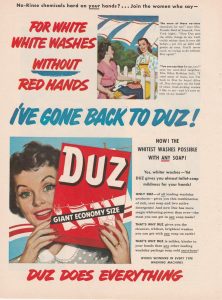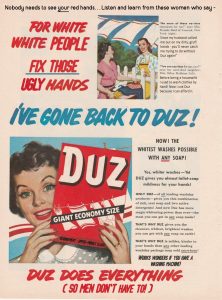Culture Jam Assignment
Original Ad

I have chosen to jam on Duz’s laundry detergent advertisement that was made to capture the attention of the stereotypical housewife in the 1950s. The main problem that arises is the perpetuation of the need to live the ideal white middle-upper class lifestyle as a housewife. The detail of the advertisement that stood out most was the repetition of the word “white”. Although it is a detergent company and they are trying to sell a product that makes clothing whiter, they are simultaneously selling “whiteness” as a superior race. An example in the advertisement is the phrase: “magic whitening power”, which is a latent way to suggest that if you were to purchase this product you would experience the glory of whiteness. Additionally, the words “cleanest” and “brightest” are included alongside “whitest”, to allude to the fact that whiteness is also all of these things. Not only is the advertisement demonstrating the desire for whiteness through their word choice, but also through their choice of female models. All three models chosen are clichéd depictions of white upper-middle-class housewives and they include testimonials by the women to make it more personable. With the inclusion of the phrase “join the women who say…”, it is clear that the only people who will be using the product are women. Another element that reinforces women’s use of the product, is the concern with ”no red hands”. This alludes to the fact that women should be doing the house chores but should not have any blemishes or changes in their complexion to show for it. This supports society’s toxic expectations for women to always have a presentable image and appear dainty and feminine, regardless of what work they are doing.
The models chosen are portrayed to be stay-at-home wives, therefore there is a presumption that they rely on a man for income. The advertisement encourages women to be dependant on men for their monetary needs since they are promoting a housewife lifestyle, yet they are selling them a product that requires money to buy. The company has also excluded all other social classes aside from upper-middle-class folk. For example, the company is advertising the “giant economy size”, yet only wealthier families can afford to spend so much on laundry detergent at one time. The advertisement also includes that the product “works wonders in every type of washing machine”. This automatically boycotts all families who cannot afford a washing machine and therefore leaves only upper-middle-class families who are most frequently white, the ability to purchase Duz laundry detergent.
“New” Ad

My alteration of the original advertisement included changes to only words and phrases on the page. I did not feel the need to alter the images since they were already blatant in who the recipients were for their product. Through my modifications, I wanted to make the inconspicuous message of the original advertisement evident. First, I substituted the word “washes” in the main phrase of the campaign “white white washes”, to “people”, since they are the clear target audience. Next, I replaced “without red hands” to “fix those ugly hands”. My reasoning for this was to show that the people at Duz do not legitimately care for the well being of women’s hands. What they do care about is the representation of their company through the hands of feminine women, and this cannot be done if these women’s hands are damaged by their product. I also changed the testimonials of the models to allude to the fact that they are dependent on their husbands for the ability to use Duz. This product, to upper-middle-class people, is just a regular household object. However, it does hold privilege in comparison to those who cannot afford it by means of social class, race or gender. I sought to show this by re-wording the phrase “works wonders in every type of washing machine”. I changed this to read: “works wonders if you have a washing machine!”. Additionally, I added at the bottom of the Duz box that it is a requirement to be upper-middle-class to own this product. I felt that these changes were essential because a lack of those elements automatically disqualifies somebody from owning laundry detergent. Lastly, at the bottom of the advertisement, I added: “Duz does everything (so men don’t have to)”. I felt this was an important addition since the entire campaign revolves around the market of housewives. Housewives and dependency on a husband would not exist if it were not for the patriarchal society that we live in. Consequently, this product endorses male supremacy and ensures that men are well taken care of by their wives.
I felt that this assignment helped me to scrutinize the wording and images used in advertising. Although the Duz advertisement was released decades ago, I believe that our filter by which we look at advertisements now is incredibly important in evaluating the potentially damaging true message behind the surface-level content we are shown daily.